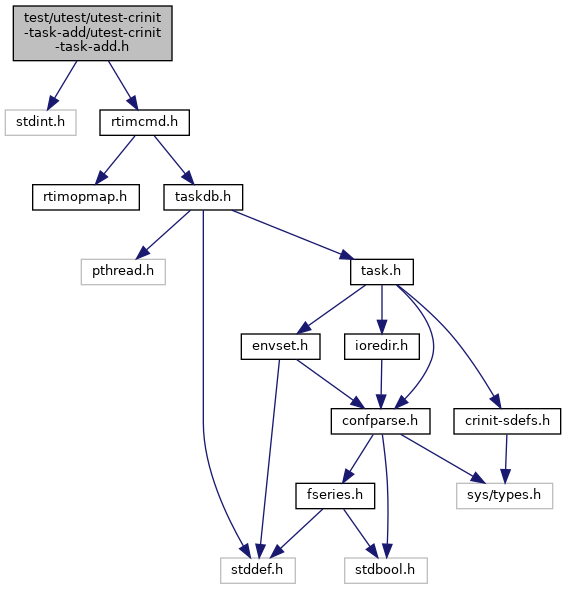(/usr/bin/git 2023-11-27, commit: bad6102)
Header declaring the unit tests for crinitClientTaskAdd(). More...


Go to the source code of this file.
Data Structures | |
| struct | crinitStoreRtimCmdArgs |
Functions | |
| int | crinitStoreRtimCmd (const uintmax_t value, const uintmax_t context) |
| int | crinitStoreRtimCmdContext (const uintmax_t value, const uintmax_t context) |
| int | crinitCheckRtimCmd (const uintmax_t value, const uintmax_t context) |
| void | crinitClientTaskAddTestSuccess (void **state) |
| void | crinitClientTaskAddTestConfPathNull (void **state) |
| void | crinitClientTaskAddTestForceDepsNull (void **state) |
| void | crinitClientTaskAddTestForceDepsEmpty (void **state) |
| void | crinitClientTaskAddTestOverwriteBoolToString (void **state) |
| void | crinitClientTaskAddTestBuildRtimCmdError (void **state) |
| void | crinitClientTaskAddTestCrinitXferError (void **state) |
| void | crinitClientTaskAddTestCrinitResponseCodeError (void **state) |
| void | crinitClientTaskAddTestCrinitResponseCmdError (void **state) |
Detailed Description
Header declaring the unit tests for crinitClientTaskAdd().
Function Documentation
◆ crinitCheckRtimCmd()
| int crinitCheckRtimCmd | ( | const uintmax_t | value, |
| const uintmax_t | context | ||
| ) |
Cmocka check function comparing the argument value with the given context.
This function is used to check a pointer value passed to a mock function. It uses the pointer value previously saved by crinitStoreRtimCmd(). This has to be done this way, as the arguments to expect_check() are evaluated at test setup before the function under test runs, but the by-reference pointer is only known at runtime.
Example usage: crinitRtimCmd_t *crinitBuildRtimArgCmd; expect_check(__wrap_crinitXfer, cmd, crinitCheckRtimCmd, &crinitBuildRtimArgCmd);
◆ crinitClientTaskAddTestBuildRtimCmdError()
| void crinitClientTaskAddTestBuildRtimCmdError | ( | void ** | state | ) |
Unit test for crinitClientTaskAdd() testing error handling for crinitBuildRtimCmd().
◆ crinitClientTaskAddTestConfPathNull()
| void crinitClientTaskAddTestConfPathNull | ( | void ** | state | ) |
Unit test for crinitClientTaskAdd() with confFilePath as NULL.
◆ crinitClientTaskAddTestCrinitResponseCmdError()
| void crinitClientTaskAddTestCrinitResponseCmdError | ( | void ** | state | ) |
Unit test for crinitClientTaskAdd() testing error handling for wrong command in response.
◆ crinitClientTaskAddTestCrinitResponseCodeError()
| void crinitClientTaskAddTestCrinitResponseCodeError | ( | void ** | state | ) |
Unit test for crinitClientTaskAdd() testing error handling for error code response.
◆ crinitClientTaskAddTestCrinitXferError()
| void crinitClientTaskAddTestCrinitXferError | ( | void ** | state | ) |
Unit test for crinitClientTaskAdd() testing error handling for crinitXfer().
◆ crinitClientTaskAddTestForceDepsEmpty()
| void crinitClientTaskAddTestForceDepsEmpty | ( | void ** | state | ) |
Unit test for crinitClientTaskAdd() with forceDeps as empty string.
◆ crinitClientTaskAddTestForceDepsNull()
| void crinitClientTaskAddTestForceDepsNull | ( | void ** | state | ) |
Unit test for crinitClientTaskAdd() with forceDeps as NULL.
◆ crinitClientTaskAddTestOverwriteBoolToString()
| void crinitClientTaskAddTestOverwriteBoolToString | ( | void ** | state | ) |
Unit test for crinitClientTaskAdd() testing overwrite is passed on correctly.
◆ crinitClientTaskAddTestSuccess()
| void crinitClientTaskAddTestSuccess | ( | void ** | state | ) |
Unit test for crinitClientTaskAdd(), successful execution.
◆ crinitStoreRtimCmd()
| int crinitStoreRtimCmd | ( | const uintmax_t | value, |
| const uintmax_t | context | ||
| ) |
Cmocka check function storing the argument value.
This function is used to mock a by reference return value that would be written to a pointer. In order to later check the same pointer is used for other calls, this can be used as an expect_check() function that does not actually check the parameter, but saves a copy of the pointer.
The parameter types of this function match the Cmocka interface, but will be casted internally as if they were: int crinitStoreRtimCmd(const crinitRtimCmd_t *value, const crinitRtimCmd_t **context);
Example usage: crinitRtimCmd_t *crinitBuildRtimArgCmd; expect_check(__wrap_crinitBuildRtimCmd, c, crinitStoreRtimCmd, &crinitBuildRtimArgCmd);
◆ crinitStoreRtimCmdContext()
| int crinitStoreRtimCmdContext | ( | const uintmax_t | value, |
| const uintmax_t | context | ||
| ) |
Cmocka check function storing the argument value and setting a mocked value.
This function is used to mock a by-reference return value by writing a mocked value to the given a pointer. In order to later check the same pointer is used for other calls, this can be used as an expect_check() function that does not actually check the parameter, but saves a copy of the pointer and writes a mocked value to the pointed object.
The parameter types of this function match the Cmocka interface, but will be casted internally as if they were: int crinitStoreRtimCmd(const crinitRtimCmd_t *value, const crinitStoreRtimCmdArgs *context);
The context is a casted pointer to a crinitStoreRtimCmdArgs. The argument value will be written to the context->ptr member, while the member context->value will be placed into the object pointed to by value.
Example usage: crinitRtimCmd_t *crinitXferArgRes; char *crinitXferArgResOKArgs[1] = { CRINIT_RTIMCMD_RES_OK }; crinitRtimCmd_t crinitXferArgResOK = { .op = CRINIT_RTIMCMD_R_ADDTASK, .argc = 1, .args = crinitXferArgResOKArgs }; struct crinitStoreRtimCmdArgs crinitXferArgResContext = { &crinitXferArgRes, &crinitXferArgResOK, }; expect_check(__wrap_crinitXfer, res, crinitStoreRtimCmdContext, &crinitXferArgResContext);